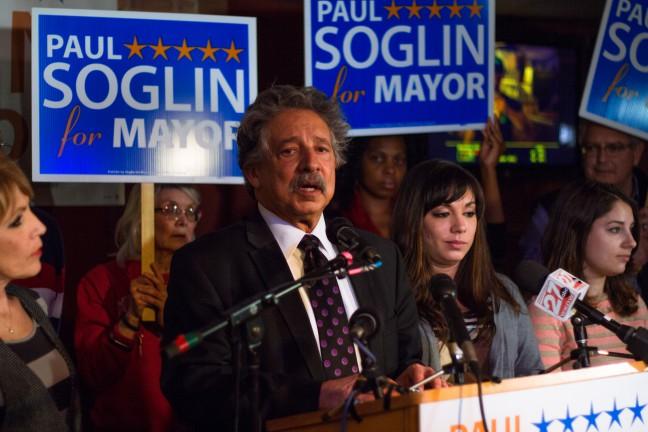Paul Soglin will serve an eighth term as Madison’s mayor after comfortably beating back a challenge from Ald. Scott Resnick Tuesday night.
Soglin, who became Madison’s youngest mayor at 27 years old in 1973, was re-elected with 71.9 percent of the vote against Resnick’s 27.1 percent, according to preliminary results from the Dane County clerk.
Tuesday’s election saw 29.7 percent of the city’s voters turn out, the City of Madison clerk reported.
At his election party at The Brink Lounge, Soglin said the campaign has been one of the longest he’s faced, but that he’s excited for the future and the potential Madison has.
“I really believe in Madison and that we can be the best city in the world, that we can be the place to solve all of these challenges and earn that number one ranking in every single category for every single record,” Soglin said.
Resnick, the outgoing alder for the University of Wisconsin student-heavy District 8, told his supporters at The Fountain that he’ll continue serving the community however he can and thanked Soglin for his “lifetime service” to the city.

He called his campaign an “uphill battle” given Soglin’s high name recognition, but that he looks forward to Soglin committing to his campaign promises of developing a “more equitable and a more prosperous economy.”
“I am proud we ran a clean race, an honest race and stuck to the issues,” Resnick said, thanking his supporters for helping with his campaign.
Soglin got his start in Madison politics as a student at UW, where he graduated in 1966. He became a city alder in 1968 and was elected to his first term as mayor in 1973, a spot he’s held on and off since.
The race began with five candidates, but voters narrowed it down to two in a low-turnout primary in February, in which Soglin walked away with 52.7 percent of the vote and Resnick got 23.3 percent.
Soglin and Resnick began the campaign butting heads on issues they’ve split on in the past, including regulation of rideshare companies such as Uber and Lyft and solving the city’s issue of homelessness.
But the March 6 officer-involved shooting on 19-year-old Tony Robinson forced both candidates to address a community growing increasingly discontent with city leaders. The debates began focusing more and more on policing and community violence.
Soglin addressed Robinson’s death Tuesday night.
“The tragedy of Tony Robinson’s death galvanized the City of Madison and Dane County to address many of these issues, and it’s unfortunate that it takes that kind of tragedy to get us aligned, to get us moving in the right direction,” Soglin said. “I’m determined to make sure we don’t lose that.”
Throughout the campaign, Soglin differed from Resnick in terms of how to make Madison safer. Resnick continually called for for the creation of a new west side police station, but Soglin disagreed, saying a new police station would not bring additional officers to the streets.
Instead, he continually stressed the importance of community partnerships, frequently mentioning the city’s current partnerships with Centro Hispano of Dane County and the Madison Area Urban Ministry.
Resnick, who’s the vice president at Hardin Design and Development, will be leaving the City Council after four years. Zach Wood, a UW senior, will take his spot after running unopposed on Tuesday.
“He is going to do a phenomenal job representing students on campus … and he will live up to the very high standards I would have for any of my successors,” Resnick told The Badger Herald in January.
University of Wisconsin senior automatically wins seat on Madison’s City Council
In other election results, state Supreme Court Ann Walsh Bradley, who’s part of the liberal wing in the court, was re-elected to another ten year term, defeating Rock County Circuit Court Judge James Daley.
But liberals saw a narrow defeat in a referendum that changes how the chief justice is elected. The current chief justice, Shirley Abrahamson, is the second member of the liberal wing, and is chief justice because she’s been on the court the longest.
Chief justice selection process could change under new amendment
Wisconsin voters on Tuesday approved a constitutional amendment that would make the seven justices elect who will be the chief justice, removing the current seniority system. Liberals have criticized the measure as one that would force Abrahamson out from the post, while conservatives have portrayed it as one that increases democracy.


